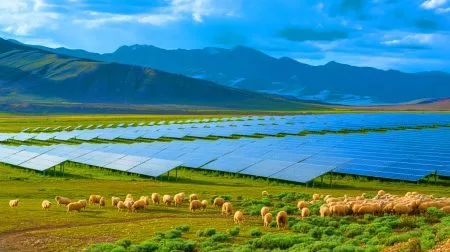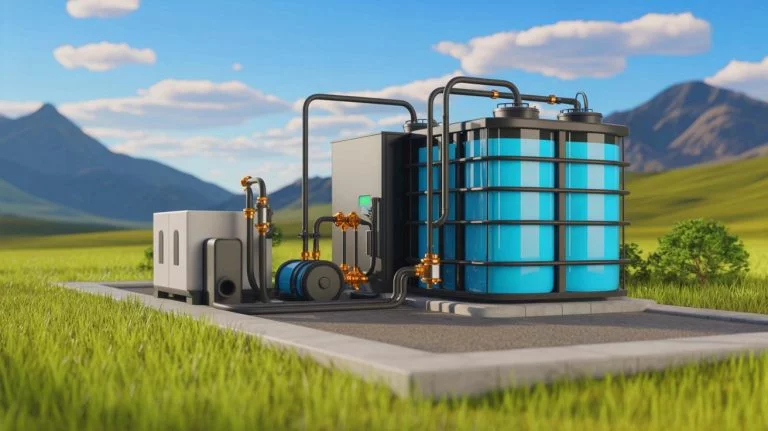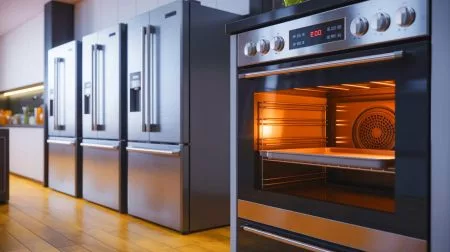| IN A NUTSHELL |
|
In a world striving for sustainable energy solutions, a breakthrough in energy storage could redefine how we power our lives. A startup in Marlborough, Massachusetts, has unveiled an innovative organic flow battery poised to compete with traditional lithium-ion solutions for grid-level storage. This development promises to revolutionize the way we store renewable energy, offering a potentially lower-cost, scalable, and efficient alternative. As temperatures rise and extreme weather events become more frequent, driven by fossil fuel emissions, such technological advancements are not just timely but essential for a sustainable future.
The Rise of Organic Flow Batteries
The concept of flow batteries, though not new, has historically been held back by limitations such as high costs and corrosive materials. However, the startup XL Batteries has introduced a game-changing solution by utilizing organic materials that are both cost-effective and environmentally friendly. Unlike their predecessors that relied on expensive and corrosive components, these new batteries use durable organic molecules capable of holding a charge without degrading quickly. This advancement not only minimizes the environmental impact but also opens the door for more extensive deployment in stationary applications, where size and weight are less of a constraint.
Tom Sisto, co-founder of XL Batteries, highlighted the compelling economics of their design. By using molecules stabilized in pH-neutral water, XL Batteries has created a system that maintains nearly 100% electrochemical efficiency. The result is a safe, scalable product with a projected lifespan of two decades, capable of powering tens of thousands of homes when scaled appropriately. This innovation is a critical step towards reducing dependence on fossil fuels and minimizing the carbon footprint of energy storage.
Transforming Energy Storage for a Sustainable Future
Flow batteries are engineered with a unique setup that includes a network of pipes, fluid holding tanks, and pumps. These components work in unison to transfer liquid past a membrane, converting chemical energy into electrical energy. This design allows for high power and long-duration energy storage, addressing one of the significant challenges of renewable energy sources: their intermittency. By providing a reliable method to store excess energy generated by solar and wind power, flow batteries can ensure a steady supply of electricity, even when natural conditions are not optimal.
The importance of storing renewable energy cannot be overstated. As traditional lithium-ion batteries, like Tesla’s Megapacks, rely on expensive materials sourced from international markets, the need for a more sustainable and cost-effective solution is evident. XL Batteries’ organic flow battery offers a promising alternative, reducing reliance on foreign resources and promoting energy independence. This shift is crucial for supporting a greener grid and ensuring energy security in the face of increasing demand and climate challenges.
Challenges and Opportunities in Commercialization
Despite the promising attributes of organic flow batteries, there are hurdles to overcome before widespread adoption can occur. One of the primary challenges is the system’s bulkiness, which limits its application to stationary uses. However, the potential for grid-level storage is immense, as these batteries can be housed in shipping containers, allowing for modular expansions based on energy needs. XL Batteries is actively seeking partnerships with power producers to demonstrate their technology’s capabilities, with Texas identified as a prime location for such initiatives.
The development of organic flow batteries aligns with government efforts to improve energy storage technologies. Research at institutions like Concordia University in Montréal focuses on reducing the size and enhancing the efficiency of these systems. As the commercial design nears completion, XL Batteries is poised to make a significant impact on the energy landscape. By providing a sustainable solution for storing renewable energy, this innovation holds the potential to revolutionize how we power our world.
The Future of Clean Energy Storage
As we look towards a future where clean energy is the norm, innovations in storage technology will play a pivotal role in achieving sustainability goals. XL Batteries’ organic flow battery represents a significant leap forward, offering a practical solution to some of the most pressing challenges in energy storage. By reducing air pollution and enhancing grid reliability, this technology could drastically alter the energy landscape, paving the way for a more sustainable and resilient future.
As the world grapples with the impacts of climate change, the need for efficient and scalable energy storage solutions becomes increasingly urgent. How will innovations like organic flow batteries transform our approach to energy and sustainability in the coming decades?
Did you like it? 4.3/5 (23)







Wow, this sounds like a game-changer! How soon can we expect these to hit the market?
Why is Texas identified as a prime location for storage demonstrations?
Is there an estimate on how much households could save with these new systems?
Sounds like science fiction! Can’t wait to see it in action. 🚀
What are the maintenance requirements for these batteries?
Thank you XL Batteries for pushing the boundaries of what’s possible! 🌿
Can these batteries operate efficiently in extreme weather conditions?
Why hasn’t anyone thought of organic flow batteries before? 🤔
Great step towards sustainability, but when will we see it scaled up?
I’m skeptical 🤨. What makes these batteries more reliable than those we already have?
How do these batteries perform compared to traditional lithium-ion ones in terms of capacity?
Do we have any real-world examples of this tech in action yet?
Hope this tech gets the funding it needs to succeed! 💰
Are there any known drawbacks or limitations to this technology?
XL Batteries should team up with solar companies to maximize impact!
What’s the expected lifespan of these batteries in real-world conditions?
It’s impressive to see innovation focusing on sustainability. Keep it up! 🌱
Not sure about the practicality; these sound quite bulky.
How long until these are available for commercial purchase?
Is there any risk of leakage with these liquid-based batteries?
Can’t wait for the day when energy bills are a thing of the past! 😄
Can this technology be adapted for use in electric vehicles?
Thank you for shedding light on such an innovative solution. 🙏
Thank you for the informative article! I’m excited to see where this technology leads us to. 🌟
How does this compare with Tesla’s battery technology? Any direct advantages?
Looks promising, but how affordable will these be for the average consumer?
Hope this doesn’t turn into another tech that fades away because of high costs. 🤔
Finally, a battery that might not explode! 😂 Great read.
Are there any environmental concerns with the production of these organic materials?